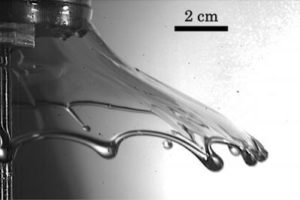new york times
Why do consumers disclose sensitive information to shady-looking websites?
Many consumers need help recognizing when their privacy is compromised,
according to a new study in the Journal of Consumer Research.
“How can we make sense of the contradictory attitudes that individuals display toward privacy — from the seemin…
Hold on, my landfill’s ringing
 By 2005, 130 million cell phones will be thrown out each year, according to a new study funded in part by the U.S. Environmental Protection Agency. Counting the phones, batteries and chargers, that comes to 65,000 tons a year, most of which will end up in landfills or being incinerated. And that has environmentalists freaked. “This is becoming a very serious problem, because the amount of cell phone waste is growing tremendously,” said Eric Most, a director at Inform, the group which issued the report. “These chemicals accumulate and persist in the environment. They get in the plants, soil, water, and then move up the stream to humans.” One approach to countering the increase that seems to have general support is a “take-back” program, in which phone manufacturers must agree to take-back old phones when consumers upgrade. Another plan sure to be DOA: Limiting waste by standardizing design elements so consumers have fewer reasons to buy new phones. “If we had had a government standard in the beginning,” one industry rep told the New York Times, “we’d still all be speaking on analog phones. And that means no e-mail, no text messaging, no Caller ID. Competition equals innovation in this case.”
By 2005, 130 million cell phones will be thrown out each year, according to a new study funded in part by the U.S. Environmental Protection Agency. Counting the phones, batteries and chargers, that comes to 65,000 tons a year, most of which will end up in landfills or being incinerated. And that has environmentalists freaked. “This is becoming a very serious problem, because the amount of cell phone waste is growing tremendously,” said Eric Most, a director at Inform, the group which issued the report. “These chemicals accumulate and persist in the environment. They get in the plants, soil, water, and then move up the stream to humans.” One approach to countering the increase that seems to have general support is a “take-back” program, in which phone manufacturers must agree to take-back old phones when consumers upgrade. Another plan sure to be DOA: Limiting waste by standardizing design elements so consumers have fewer reasons to buy new phones. “If we had had a government standard in the beginning,” one industry rep told the New York Times, “we’d still all be speaking on analog phones. And that means no e-mail, no text messaging, no Caller ID. Competition equals innovation in this case.”
So long, Bruce Perens
 Chalk up another casualty of the Hewlett-Packard/Compaq merger. For two years, Bruce Perens was an in-house evangelist for the Linux operating system at computer giant HP. He would go around extolling the virtues of the open source software to corporate clients, pointing out that it was secure, cheap and kept customers from being locked into proprietary systems like Sun Solaris or Microsoft Windows. In fact, it appears to have been his self-acknowledged baiting of Redmond that eventually did him in. Perens was canned by HP, which finds itself post-merger as the single biggest buyer of Windows for PCs and servers and thus, as the New York Times’ Steve Lohr put its, more dependent on Microsoft than ever. But don’t expect Perens to go quietly into that dark night. “I’m sorry that I had to leave HP, but I’m not going to shut up about my views,” he said. “I’m not just going to sit back and be a quiet engineer. I have a two-year-old son and I don’t want him to grow up in a world that is less free.”
Chalk up another casualty of the Hewlett-Packard/Compaq merger. For two years, Bruce Perens was an in-house evangelist for the Linux operating system at computer giant HP. He would go around extolling the virtues of the open source software to corporate clients, pointing out that it was secure, cheap and kept customers from being locked into proprietary systems like Sun Solaris or Microsoft Windows. In fact, it appears to have been his self-acknowledged baiting of Redmond that eventually did him in. Perens was canned by HP, which finds itself post-merger as the single biggest buyer of Windows for PCs and servers and thus, as the New York Times’ Steve Lohr put its, more dependent on Microsoft than ever. But don’t expect Perens to go quietly into that dark night. “I’m sorry that I had to leave HP, but I’m not going to shut up about my views,” he said. “I’m not just going to sit back and be a quiet engineer. I have a two-year-old son and I don’t want him to grow up in a world that is less free.”


